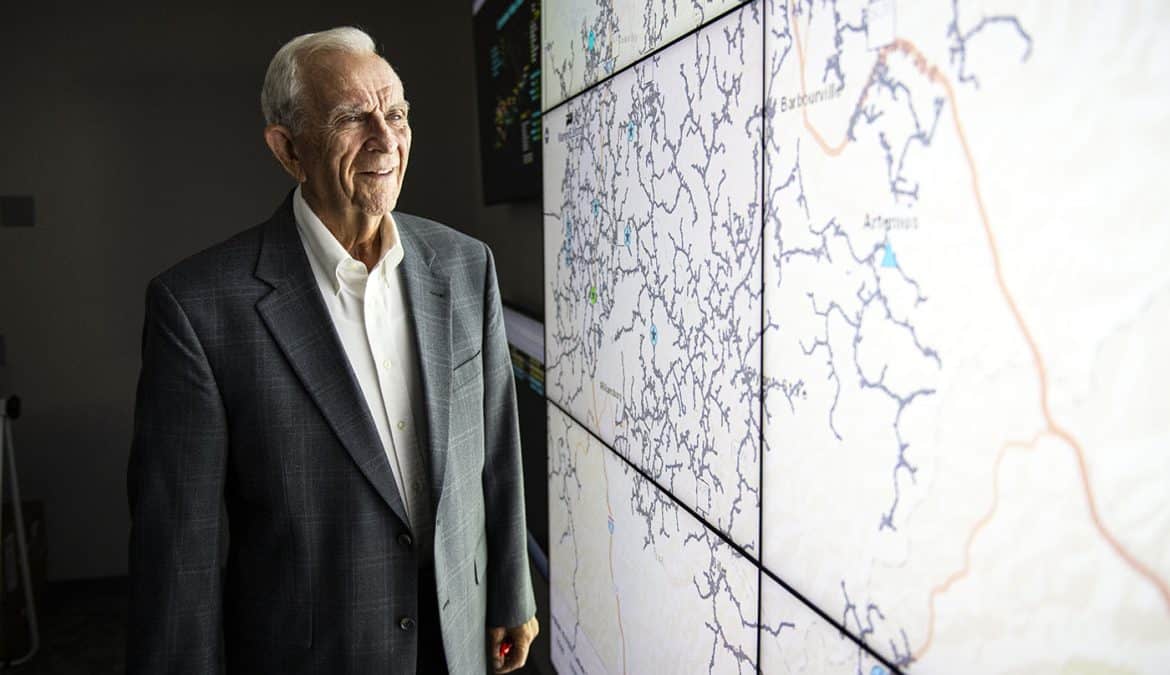One month shy of his 81st birthday, Ted Hampton emerged from the offices of the southeastern Kentucky electric cooperative he has headed since 1964 to greet guests in the co-op lobby.
On this warm August day, he’d just completed his regular office-to-office check-in with Cumberland Valley Electric employees, turning his attention to visitors from United Utility Supply.
That an octogenarian is the full-time CEO of an electric utility is certainly remarkable. But for Hampton, it’s just the beginning of his story.
In mid-December of 2020, five days after being diagnosed with COVID-19, the stubbornly strong Brush Creek native buckled.
“His oxygen levels were alarmingly low,” Hampton’s wife, Margie, recalled. “After an ambulance rushed him to the ER, they put him on the ventilator immediately. The doctor came out and told me, ‘I don’t think he’s going to make it.’”
Margie sobbed as she relived her disbelief and the rush to airlift Ted 100 miles to Pikeville Medical Center because the Corbin hospital did not have any intensive care unit beds available.
Safety protocols prohibited hospital visitors.
When Margie was finally able to see Ted several weeks later, he had not made any progress and had reached the maximum length of time he could be intubated. Doctors asked Margie to make a critical decision. Should Ted remain on life support? If so, they would remove the tube threaded down his throat and replace it with one inserted into his trachea that would connect to a ventilator to keep pumping oxygen into his lungs. Would he want that?
Margie said Ted’s brother, Elbert Hampton, recalled a recent conversation he’d had with him.
“Ted said, ‘If I get this COVID, I am going to fight like hell, because I’ve got too much to live for,’” Margie said Elbert told her. “I said, ‘OK. That’s all I need to know.’”
She directed the hospital to put the trach tube in.
Margie said a prayer with their pastor, Paula Farmer, ended by “asking God to just go in the room and touch Ted on the shoulder.”
That night, after reading her Bible and saying her prayers, Margie dreamed she was in the hospital room with Ted, “and suddenly the Lord just appeared in the room.”
“I would explain it to you if I could. He just appeared in the room, and I sat down toward the foot of the bed, and He just came in and laid His hand on Ted’s shoulder,” Margie said. “I called my pastor the next day and told her about the dream. And I said, ‘He is going to be all right.’ And, not long after that, he started improving.”
After 41 harrowing days in Pikeville, Ted was transferred on Jan. 29 to the Rockcastle Regional Hospital and Respiratory Care Center. He was still relying on a ventilator but improving each day.
Forty-five days later, the trachea tube was removed. He was finally breathing without assistance for the first time in three months.
On March 31, after 103 days of hospitalization, Ted returned home, just in time to celebrate Easter at New Hope Ministries Church of God.
“When I walked into church, the pastor said, ‘We have a miracle boy with us today. Here comes Mr. Miracle. God has saved him for a purpose.’ And I agree with that,” Ted said. “Prayer is extremely important. And friendship. Friends at church and at work and acquaintances. Those are all important and give you encouragement.”
Within a week of coming home, he was back in the office.
A COVID-19 vaccine was not yet available when Ted caught the virus, but he’s encouraging co-op employees and their families to get the shots now.
“I want to tell everyone not to underestimate how dangerous [COVID-19] is,” Ted said. “They should step up and get the shots. If they don’t do it to protect themselves, then to protect their families and protect their neighbors and schoolchildren.”
Though he’s now back at work full time, he said he’s still weak and not at full strength.
“The doctor said it would take six months to a year to get back to where I was,” he said. “Normally … I would be going to the farm, driving a tractor, bush-hogging, taking care of my honeybees.”
He plans to be back on a tractor by springtime, with gratitude for those who cared for and prayed for him, and an urgency that Kentuckians take COVID-19 seriously.
“I just want to reemphasize that all parents should take those shots and the children should take those shots when they are eligible,” Ted concludes. “Life is too precious to waste.”
Story by Joe Arnold
Excerpt reprinted with permission from Kentucky Living magazine. The full version of this story can be found at the Kentucky Living website and will be reprinted in the March 2022 issue of RE Magazine.

